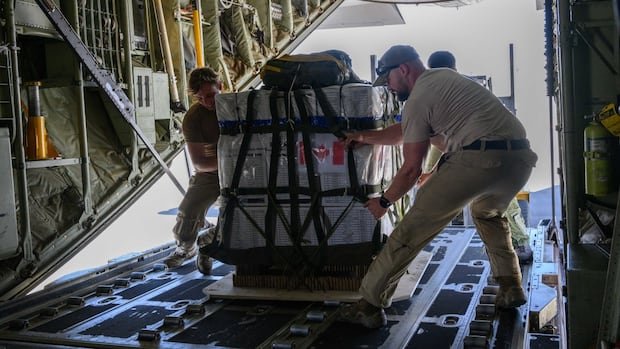The Canadian Armed Forces conducted their inaugural humanitarian airdrop over Gaza on Monday using their aircraft, delivering 9,800 kilograms of aid to Palestinians, as reported by Global Affairs Canada. CBC News had exclusive coverage of the Canadian mission, which involved providing food supplies such as lentils, oil, milk powder, and pasta via a CC-130J Hercules aircraft departing from a Jordanian airbase. This effort was part of a joint initiative by six nations to address the hunger crisis in the Palestinian region.
Global Affairs Canada stated on Monday that Canada, in collaboration with international partners, took these extraordinary measures due to severe restrictions on humanitarian access in Gaza and the unprecedented level of humanitarian needs. The statement highlighted the challenges faced by humanitarian agencies in delivering crucial food and medical assistance by land due to ongoing restrictions imposed by the Israeli government.
In an interview with CBC News, Maj. Cam MacKay from the 436 Transport Squadron expressed the team’s strong motivation for the mission, emphasizing the importance of providing aid to those in need on the ground. The Canadian Forces, along with five other countries including Jordan, the United Arab Emirates, Egypt, Germany, and Belgium, participated in the airdrop operation in Gaza. France and Spain were also involved in previous airdrops over the past four days, as confirmed by the Israel Defence Forces (IDF).
Palestinians in Gaza made heartfelt pleas for additional aid, as witnessed by Mohamed El Saife, a freelance videographer for CBC News, who captured the chaotic scenes on the ground during the aid drop. The desperation was palpable as crowds rushed to the drop site in central Gaza, with testimonies of people struggling to receive aid amidst the challenging circumstances.
Aid experts have noted that airdrops are less effective than truck convoys, with incidents of aid pallets falling into the sea and causing harm to individuals on the ground. Israel has attributed the suffering in Gaza to Hamas and has taken measures to facilitate aid delivery to the population, including airdrops and establishing protected routes for aid convoys.
Karen Bongard, political counsellor of the Canadian Embassy in Jordan, emphasized that while airdrops are a temporary solution, Canada remains committed to supporting peace and security in the region. Prime Minister Mark Carney acknowledged the humanitarian crisis in Gaza and pledged to work with international partners to develop a viable peace plan and ensure the necessary aid reaches the region.
In response to the ongoing Israeli-Palestinian conflict, Carney announced plans for Canada to officially recognize the state of Palestine, contingent on reforms by the Palestinian Authority and the holding of elections. The decision reflects Canada’s longstanding support for a two-state solution and its commitment to promoting peace in the region.
Before last week’s declaration, Canada had advocated for a two-state solution to be achieved through peace negotiations between Palestinian and Israeli leaders. However, recent developments, including the expansion of Israeli settlements and the escalating violence in the region, prompted Canada to expedite its recognition of Palestine. Israel’s ambassador to Canada expressed concerns that Canada’s decision could embolden Hamas, emphasizing the complex dynamics at play in the Israeli-Palestinian conflict.

